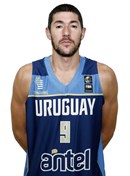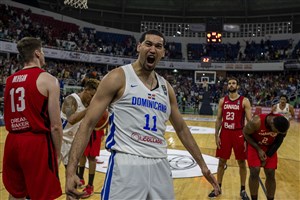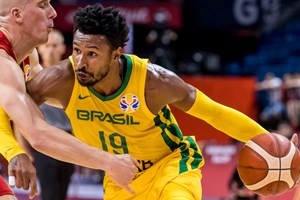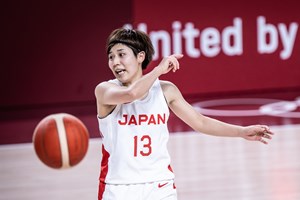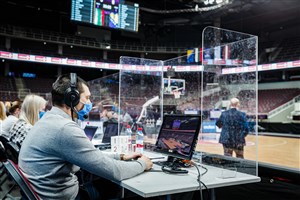
Panchi Barrera — precise passes and a perfect smile
On the court, he's able to glance at his side and do an unpredictable pass to the other to find his best-positioned teammate. Outside, he looks forward and answers undoubtedly. In both places, Gustavo Barrera is as brazen as he’s loose. The Uruguayan point guard talks about diverse subjects with the same level of comfort that flows through his game.

Proudly and consistently showcasing the light blue jersey, Panchi's story has ups and downs that are worthy of telling. The player born in the western Uruguayan city of Mercedes started very young in basketball. He played for a mere six months at Uruguay's Welcome Athletic Club, and at the young age of 16, left for Barcelona to try his luck — eventually staying for six seasons. Because of his outstanding performances in the youth teams of Joventut de Badalona, Barrera was invited to play for the Spanish national team, something that he couldn’t achieve due to a decision by the Uruguayan basketball leaders. This is how Panchi remembers it: "It was very heavy for me. My dream as a kid was to play for the Uruguayan national team, but I was advised to do it for the Spanish team, and everyone said that it'd be the best thing for me. I spent a month training with Spain's youth national team, which featured Marc Gasol and Sergio Rodríguez. I was a started, and if I could've played in that U20 European Championship in 2004, my path would've been different. A week after, they told me that the Uruguayan Federation didn't allow me to participate. From that moment on, I spent three years and a half without being able to play professionally. It was a challenging time for me. I'm not resentful, but I do feel a bit of pain because of it. I never talked about that again with the directives, and now it's part of the past.”
Another significant moment of his career was his brief NBA role. He played with the Houston Rockets in the Las Vegas 2008 summer league. “It was a phenomenal and awesome experience. I prepared for two months as I've never done before. I did well, and everything turned out fine. I was at a very high level. The only thing I needed was for Steve Francis to retire, then I'd have a place in Houston. The Rockets’ manager said it to me in those terms. But Francis retired six months after, and I couldn't achieve my dream of playing in the NBA," Panchi remembers.
The first official tournament that Barrera played with the Uruguayan national team was the 2007 Pan American Games in Rio de Janeiro. There, the team won the bronze medal. From that moment onward, the tall point guard came and went with the national team. Still, each time he was called, like in these FIBA AmeriCup 2021 Qualifiers, he enjoys the experience: “Being in the national team is beautiful. I'm not going to deny that if Rubén Magnano's there, I enjoy it twice. I love to come every time they call me. I always want to be here. I try to contribute both in and out of the court. It's very different from playing in a club.”

On many occasions, Uruguay has remained a step away from achieving its collective objectives. In fact, the Uruguayans haven’t been in a FIBA Basketball World Cup since 1986. However, Barrera rescues specific moments: “There were outstanding processes. I wasn't there, but Che García left his mark. And now, Rubén. The difference between foreign and Uruguayan coaches is noticeable. I’m not speaking ill of my compatriots, but the truth is that we work best when coaches from other countries come. Due to many circumstances, we've had incomplete squads. The thing is, we're a small country, and we don't have the number of players that Argentina or Brazil have, for example. We're few, and it's hard to find big people, tall people. That has been lacking in all tournaments. The windows system improved the situation a bit because we don't have to play five games in seven days anymore when we used to get to the most important games completely exhausted."
Magnano, who now is the athletic director of the Uruguayans, was the head coach in the qualification toward the FIBA World Cup in which the Uruguayans almost had a ticket. Barrera can't hide his admiration for the Argentine coach: “Rubén is a genius. The best thing that could happen to Uruguayan basketball, at least in the past twenty years, was that Magnano accepted coming here and be the national team's coach. Personally, he's the best coach I had on the team. He’s very demanding.”
At the age of 34, the point guard clearly knows what his professional future will be: “I'd like to be a coach. I like to analyze the game, and I'd like to coach. I'd follow Magnano's line, although I'd probably be more tolerant and not as rigid or strict as him. Each one has their own personality, and Rubén came to win a gold medal like that. I'd try to imitate him 95%. I'm going to take a course in Spain, and I'll use those contacts to prepare well so that I can be ready when an opportunity comes around. I see a lot of players that retire, and in the following year, they already start to coach. I'd like for that to happen to me to keep up my life's routine, the dynamics. However, I don't know up to when I'll be playing. I'll do it as long as my body continues to allow it because it's what I love and where I have the most fun."

Maybe due to his relaxed style or his calm pace out of the court, in Uruguayan basketball, people said that Panchi didn't attend practice sessions. Barrera dismisses these claims: "If that were true, I wouldn't have had the career I had. I wouldn't be here. A person that doesn’t train doesn’t last much in this environment that's more and more competitive and physical. What I don't like to do is to lose time. Here in Uruguay, with two practices per day, I would go in the morning, spend an hour and a half doing nothing, and that doesn't work for me. Resting well and practicing hard once in the day is more productive. So sometimes I would do that with my personal trainer, and that created the rumor that I didn't like to train."
Barrera’s talent and unexpectedness turn Barrera in a rare player for Uruguayan basketball. He shares that he feels an extraordinary admiration for the former Argentine soccer player, Juan Román Riquelme, whose creativity and effectiveness led Boca Juniors to win eleven titles. “Riquelme is more than Michael Jordan. He's the biggest of them all. Before the beautiful games, when I always put a motivational video on, I look for one with Román’s plays. He's my idol in every sense. I'm nothing like him; he's unique. They say that I see plays a couple of milliseconds before the rest, and he did the same thing, especially in the passes. But we can't be compared," says Panchi.
In the current season, after several campaigns in his country's league and a season in Argentina, Barrera played in Mexico's Astros de Jalisco. Nonetheless, even though he was the leader in assists in the tournament, his contract was cut short. Then came the opportunity to travel to Rio de Janeiro to play with Flamengo. “It's a fantastic team with teammates that have made me feel very much at home. Franco Balbi has helped me a lot, and I'm trying to fit in the work dynamic they've had for the past two years. I'm adapting to a city that’s very beautiful, but also very demanding because of its size. I'm not used to commuting an hour to go to training,” said the Mercedes native.
Life in the marvelous Brazilian city doesn't allow Barrera to share daily life with his son, Federico: “I parent the best way I can. I was never his mother's partner, and I've been a single dad for three years now. Whenever I come to Uruguay, I try to spend as much time as I can with my son. I love being a father, and something I miss is being able to enjoy him 24 hours a day, every day like many do. I'm very happy. It changed my life and the way I think because now I have a lot of new responsibilities.”
The steps ahead in his career could give Barrera the chance of playing in different countries, but he knows that his country is the place where he feels at ease: “I love Montevideo. I love it because it's a small city that has it all. I love the people of my country — a very welcoming country. Here we live in peace. There's not as much insecurity as in other larger countries." Panchi also values that in recent years, Uruguay approved laws allowing same-sex marriage, decriminalizing abortion, and regulating marijuana use: "The world is moving forward, and we need to build a more tolerant society. Same-sex marriage was a slam-dunk. As for the use of marijuana, I like that anyone that wants to use it can use it, although I don't like Uruguay being known just for that. We've achieved a lot of things, particularly during Pepe Mujica's government, who’s the icon of Frente Amplio. I'm proud that, as a society, we're moving forward in a lot of ways.”
Not even the two defeats against Brazil (83-72 in Curitiba, and 83-76 in overtime at Montevideo’s majestic Antel Arena) erase Barrera’s smile. Panchi enjoys the game and being a part of a team with his great friend, Esteban Batista, although the center doesn't join him in the ritual of drinking the traditional afternoon mate.
Pablo Cormick
FIBA

